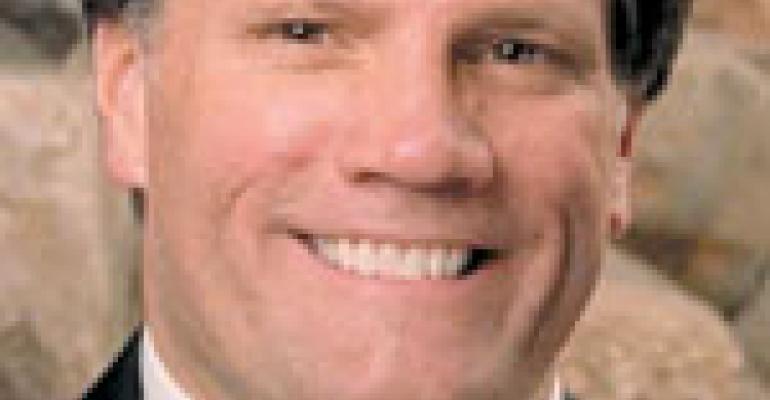Rates of turnover among chief executives and in such leadership slots as president, chief operating officer and chief financial officer are on the rise in foodservice recently, and the economic environment is getting the blame—and in some cases the credit.
An informal study by Nation’s Restaurant News revealed that nearly 40 job actions—hirings, firings, resignations or retirements—have affected “chief”-level executives in just the past six months. Also, Dallas-based People Report, a firm that tracks human resources issues for the foodservice industry, reported that annual turnover for CEOs was 16 percent in 2007, up from 13 percent in 2006.
“Most of the current wave of CEO and other C-suite terminations are related specifically to the excruciating pressure for results,” said Joni Thomas Doolin, founder and chief executive of People Report.
Doolin and other experts have observed that high food and labor costs, coupled with rising gas prices and slowdowns in consumer traffic and spending, have compelled chief executives to more carefully monitor margins along with the trajectory of their own careers.
While some CEOs and presidents have been forced out of their posts amid faltering financial results, other senior executives are leaving for better job prospects enabled by increasing growth and diversity in foodservice. Still, the economy appears to be a prevalent factor in much of the turnover.
“In many cases, the patience of private-equity funds has shown itself to be shorter than even the public-market pressures,” Doolin said. “Likewise, as companies are bought, sold, merged, etc., in this climate, in most cases new ownership wants to take their best crack at a clean slate and fresh leadership. Hence the revolving door.”
This year began with very high-profile executives departing from their jobs: Jim Donald at Starbucks Corp., Wally Doolin at Buca Inc. and Daryl Brewster at Krispy Kreme. This spring Craig Miller was let go as chief executive at Ruth’s Chris Steak House Inc., now named Ruth’s Hospitality Group.
At Rock Bottom Brewery Restaurants, founder and chairman Frank Day called for the resignations of chief executive Ned Lidvall as well as chief financial officer John Coletta and senior vice president of human resources Sugi Randall. In December Rock Bottom had cut 19 percent of its corporate staff.
Shareholders of the 490-unit Steak n Shake chain this spring voted to fire chairman Alan Gilman, a 16-year company veteran who had served as interim CEO since last August.
Tully’s Coffee Corp., the more than 140-unit chain based in Seattle, postponed its initial public offering and eliminated 14 corporate staff positions and then accepted the resignations of CEO John Buller and CFO Kristopher Galvin.
The industry has seen several changes in the CEO seat in a number of companies owned by private-equity firms.
Gene Baldwin, a consultant with GRG Partners, has stepped in as interim CEO at the 75-unit Black Angus Steakhouse chain, based in Los Altos, Calif. CRG had been involved in the purchase of Black Angus by Versa Capital Management of Philadelphia. Shortly after that transaction, former president and CEO Bruce MacDiarmid resigned to take the same post at the 99-unit Shari’s Family Restaurants in Beaverton, Ore.
Industry veteran Kerry Kramp became president and chief executive of the more than 300-unit Sizzler USA this month. He replaced Ken Cole, who stepped down in February to head the Quarter Steak & Lube Chain in Sharon, Pa. Sizzler is owned by Australia-based Pacific Equity Partners, which has been trying to sell Sizzler and the San Diego-based Pat & Oscars chain, which has about 20 units. John Wright resigned from Pat & Oscars in March, saying he planned to become more involved in a Pizza Hut franchise operation in Brazil.
KarpReilly LLC, a Greenwich, Conn.-based private-equity firm, bought a majority ownership stake in the Habit Burger Grill, a 20-unit chain based in Santa Barbara, Calif., and convinced Russ Bendel to leave his CEO post at The Cheesecake Factory to head up the smaller outfit. Bendel had only been with the high-volume cheesecake specialist for nine months when he took the new opportunity last month.
“Everyone’s situation is individual,” said Bendel, who had been chief executive of Mimi’s Cafe, another KarpReilly investment target, before he joined The Cheesecake Factory. The Habit, Bendel said, represented “an opportunity to build a brand and help shape its growth.”
Some of the shifting among chief executives has been from public to private firms and from big to smaller companies, observed David Mansbach, managing director of the lodging, restaurants and gaming practice at Ferguson Partners Ltd. in New York.
“Some of these individuals are taking their skill sets to smaller companies that aren’t in trouble and don’t have a good slate [of executive leaders] to grow their business,” Mansbach said.
For example, David Goronkin left Famous Dave’s of America Inc., in Minnetonka, Minn., which operates or is franchisor of 168 barbecue restaurants in 35 states, for the four-unit Redstone American Grill casual-dining chain in Wayzata, Minn.
Famous Dave’s hired Wilson Craft, an executive vice president of operations for LongHorn Steakhouse, in April to replace Goronkin. The pace of chief-executive hirings has increased, said executive recruiter Alice Elliot, founder of the Tarrytown, N.Y.-based Elliot Group.
“Boards have truly become more active and more aware of their responsibility to keep an eye on the organization they’re aligned with,” she said. “Everyone is under tremendous pressure, but at the same time there are great opportunities that happen regardless of the economy.”
Bendel noted that one additional reason for higher turnover could be that senior-level executives have many more options than they did a few years ago.
“The business is much more competitive than it was five years ago, and I’m sure the next five years will be more competitive,” Bendel said.

